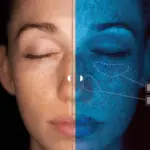Understanding your skin type is really important for a variety of both cosmetic and health reasons, from choosing the right skincare regime to identifying skin conditions you may be more prone to getting. The most important perhaps, is that your skin type can be an indicator of your susceptibility to developing skin cancer.
Skin cancer is the most common form of cancer in the UK, with over 400 people being diagnosed every day. Melanoma skin cancer is on the rise, with incidence rates increasing by 45% in the UK in the last decade, despite the warnings of the dangerous effects of sun exposure. Most skin cancer is caused by ultraviolet (UV) light in the form of sunlight or tanning beds, which damages skin cells. Some skin types are more easily damaged by the sun’s UV rays so it is important to know if you need to be extra vigilant in protecting your skin from the sun.
The Fitzpatrick Scale is commonly used to classify different skin types. The scale was developed by Thomas Fitzpatrick in 1975 to measure how skin reacts to ultraviolet light or sun exposure. The numerical scale was based on measuring the amount of melanin in the skin following exposure to the sun as well as identifying physical characteristics such as eye colour and hair colour. The scale is commonly used by dermatologists to assess if treatments are suitable to the individual, as well as assessing risk factors to skin cancer.
The Fitzpatrick Scale
The Fitzpatrick Scale defines 6 overarching skin types based on physical features and how the sin reacts to the sun. The skin types are:
TYPE 1
- Extremely light skinned
- Light blue, grey or green eyes
- Light blonde or red hair
- In the sun, burns easily and the skin will peel without tanning
TYPE 2
- Fair skinned
- Blue, grey or green eyes
- Blonde hair
- Skin will freckle in the sun, it will usually burn and peel and rarely tans
TYPE 3
- Fair/beige skin tone
- Hazel or light brown eyes
- Light brown or dark blonde hair
- Skin can tan in the sun, but can freckle or burn occasionally
TYPE 4
- Olive or light brown skin tone
- Dark brown eyes
- Dark hair
- In the sun, the skin will usually tan without freckling or burning
TYPE 5
- Dark brown skin tone
- Dark brown eyes
- Dark brown or black hair
- Skin always tans in the sun, with very rarely burning or prickling
TYPE 6
- Very dark skin tone
- Dark brown eyes
- Dark brown or black hair
- Skin never burns or freckles in the sun and always tans darkly
People with light skin tones, particularly Fitzpatrick skin type 1 or 2 have a very high risk of sun damage and will see earlier signs of ageing. Due to this, they are also at an increased risk of developing skin cancer. Sun spots, age spots and freckles are also more likely in these skin types and intense sunburn is more likely to be experienced. Those with type 3 or 4 skin types are also at risk of sun damage but are likely to tan when exposed to sunlight. People who fall into this category need to be vigilant as even though it may appear the skin is less vulnerable to the adverse effects of sun exposure, they are still at risk of damaging their skin if exposed to UV light. Those with Fitzpatrick skin types 5 and 6 rarely burn unless exposed to particularly intense sunlight. This isn’t to say however that they are not vulnerable to the sun damage and may experience hyperpigmentation or hypopigmentation.
No matter what your skin type, you are still susceptible to sun damage so need to take steps to protect your skin. Staying out of the sun when it is at its strongest, covering up using a hat and light clothing and wearing a sun cream with a high SPF factor are advised.




